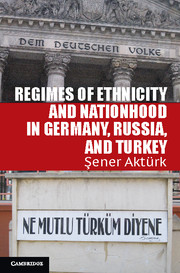Book contents
- Frontmatter
- Contents
- List of Tables, Figures, Graphs, and Maps
- List of Abbreviations
- Acknowledgments
- Part I Theoretical Framework and Empirical Overview
- Part II Germany
- Part III Turkey
- 4 Challenges to the Ethnicity Regime in Turkey
- 5 From Social Democracy to Islamic Multiculturalism
- Part IV Soviet Union and The Russian Federation
- Part V Conclusion
- Bibliography
- Index
- References
5 - From Social Democracy to Islamic Multiculturalism
Failed and Successful Attempts to Reform the Ethnicity Regime in Turkey, 1980–2009
Published online by Cambridge University Press: 18 December 2014
- Frontmatter
- Contents
- List of Tables, Figures, Graphs, and Maps
- List of Abbreviations
- Acknowledgments
- Part I Theoretical Framework and Empirical Overview
- Part II Germany
- Part III Turkey
- 4 Challenges to the Ethnicity Regime in Turkey
- 5 From Social Democracy to Islamic Multiculturalism
- Part IV Soviet Union and The Russian Federation
- Part V Conclusion
- Bibliography
- Index
- References
Summary
“…an Arab has no superiority over a non-Arab nor a non-Arab has superiority over an Arab….”
Prophet Muhammad, Farewell Address“Happy is the one who says, ‘I am a Turk’”
Mustafa Kemal Atatürk, Tenth Year AddressTurkey's Movement Away from Assimilation toward Multiculturalism under the AKP
In 2004, Turkey's new government led by the Justice and Development Party (AKP) initiated broadcasting in Kurdish and four other minority languages (Arabic, Bosnian, Circassian, and Zaza), followed by the inauguration of a new state-funded public TV channel exclusively broadcasting in Kurdish, TRT 6, in 2009. How did such a tremendous change occur in Turkey's approach to ethnic and linguistic diversity?
Between 2004 and 2009, the AKP government in Turkey implemented the most radical official changes in the state's approach to ethnic, linguistic, and sectarian diversity since the founding of the Republic in 1923. There was a pronounced movement away from the secular and linguistic nation-building model premised on assimilation, of which France is the classical and paradigmatic example, toward a model premised on multiculturalist accommodation of ethnolinguistic and religious-sectarian diversity. This chapter will evaluate the failed attempts at reforming state policies toward ethnic diversity in Turkey since the 1980 military coup, discuss the transformations of Alevi and Kurdish demands for recognition, and explain the successful changes in Turkey's ethnicity regime under the AKP government, which has been in power since 2002. The AKP's reforms included the recognition of linguistic diversity manifest in state television's broadcasting in Arabic, Bosnian, Circassian, Kurdish, and Zaza starting in June 2004; followed by the inauguration of a state television channel, TRT 6, exclusively in Kurdish in January 2009; and the public recognition given to the Alevi belief system through the “Alevi opening” between late 2007 and 2009.
- Type
- Chapter
- Information
- Publisher: Cambridge University PressPrint publication year: 2012



